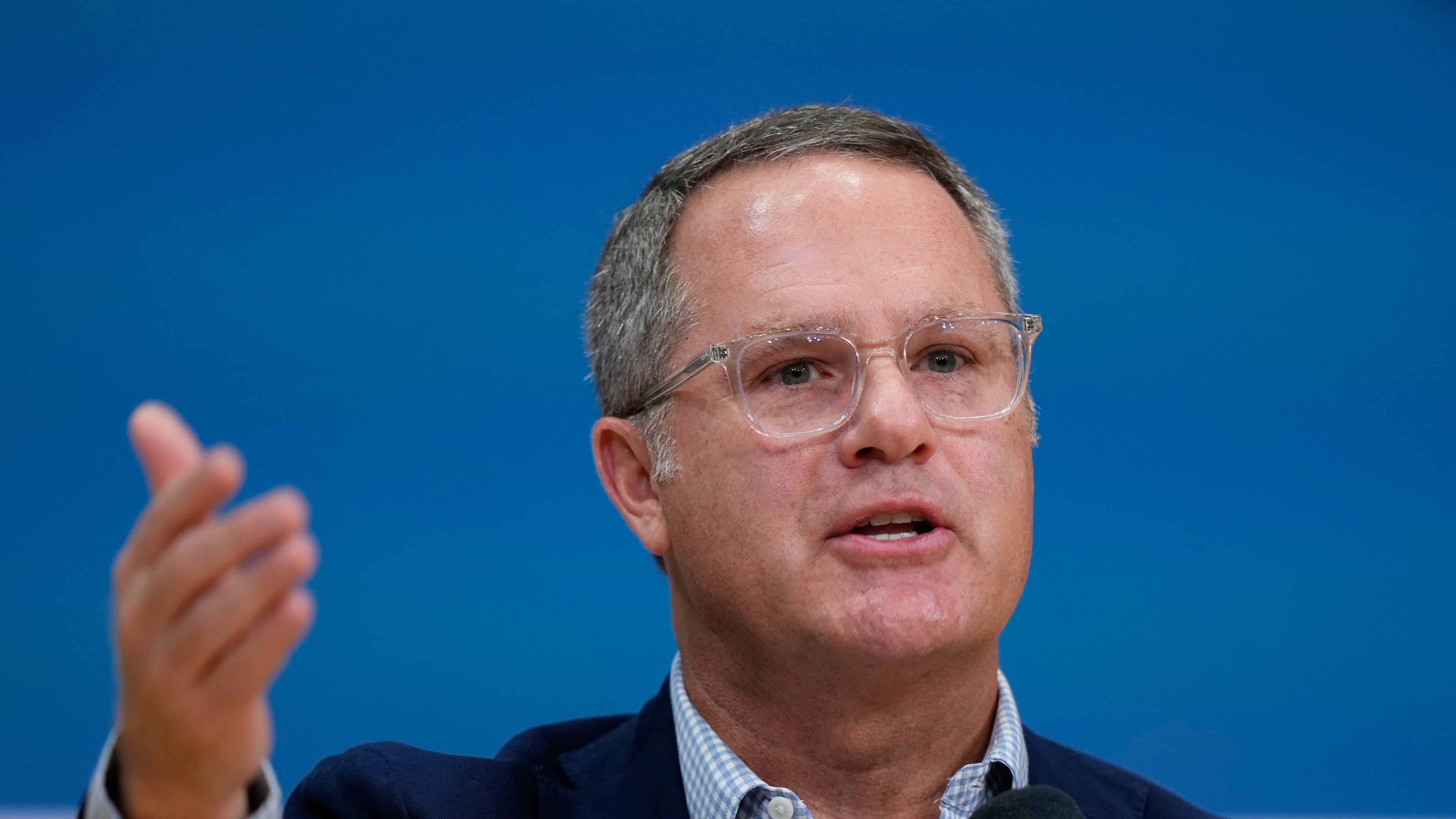Walmart CEO Doug McMillon announces his surprise retirement at age 59

NEW YORK (AP) — Walmart CEO Doug McMillon, who turned America's largest retailer into a tech-powered giant and spearheaded a period of robust sales growth since becoming chief executive in 2014, plans to retire early next year, the company said Friday in a surprise announcement.
John Furner, 51, the head of Walmart's U.S. operations, will take over on Feb. 1, the day after McMillon's retirement becomes effective, the company said. Although McMillon is set to spend a year advising his successor, Walmart shares fell 3% immediately in premarket trading after the news of the unexpected leadership change.
Unlike Amazon's Jeff Bezos or Tesla's Elon Musk, McMillon isn't a household name, but he has played a key role in the U.S. economy. Walmart's performance serves as a barometer of consumer spending given its size and vast customer base. The company maintains that 90% of U.S. households rely on Walmart for a range of products, and more than 150 million customers shop on its website or in its stores every week.
Walmart also is the nation's largest private employer, with 1.6 million workers. That includes corporate personnel and people working for Sam's Club, the membership warehouse-store chain that Walmart owns. Globally, Walmart employs 2.1 million people.
The pending CEO switch comes at a challenging time for retail companies and other employers that have spent almost 11 months navigating an uncertain economic environment as President Donald Trump’s administration adopted volatile policies on tariffs and initiated an immigration crackdown that threatened to shrink the supply of workers.
McMillon, a University of Arkansas graduate, started with Walmart in 1984 and became chief executive three decades later. During his tenure as CEO, he invested heavily in employees by increasing wages, expanding parental leave and launching a program for employees seeking advancement and education opportunities to earn certificates and degrees.
Under his leadership, Walmart has been laser-focused on maintaining low prices while embracing new technology like artificial intelligence and robotics. McMillon also helped to improve the company's reputation, softening its image as a ruthless low-price operator by personally connecting with hourly workers and committing to goals such as reducing the carbon emissions that cause climate change.
“Over more than a decade as CEO, Doug led a comprehensive transformation by investing in our associates, advancing our digital and e-commerce capabilities, and modernizing our supply chain," Walmart Chairman Greg Penner, the son-in-law of the late Walmart founder Sam Walton, said. "He leaves Walmart stronger, more innovative, and better aligned with our purpose to help people save money and live better.”
Furner started at Walmart in 1993, working as an hourly store associate in Bentonville, Arkansas, where the company is based. He has lived and worked in multiple countries and served as president and CEO of the U.S. division of Sam's Club, before taking the same roles at Walmart U.S.
Under McMillon, Walmart's annual revenue has grown from $485.7 billion to $681 billion in its latest fiscal year. Its stock was hovering around $25 per share when he came to the helm; now, it is over $102.
When he became CEO, stores were messy, sales were stagnant and worker morale was low. McMillon thought the company needed to increase pay and create pathways for hourly workers to advance in their careers. In 2015, Walmart announced a three-year, $2.7 billion investment to increase wages and create new education and training opportunities.
But when McMillon briefed investors that year and cut the annual sales forecast, investors weren't happy, sending Walmart shares down and destroying $21.5 billion in market value in hours. The company gradually regained investors' confidence with higher sales, new customers and greatly improved employee retention rates.
McMillon's time as CEO also will be remembered as the period when Walmart stopped selling ammunition for handguns and short-barrel rifles and asked customers not to openly carry firearms in its stores even in states that allowed it. The decision came days after a 2019 mass shooting in Odessa, Texas, killed seven people and followed back-to-back shootings the prior month, one of them at a Walmart store.
Walmart invested heavily in e-commerce and faster deliveries under McMillon's stewardship. The company said in August that roughly one-third of recent deliveries from its U.S. stores involved orders asking for goods to arrive in three hours or less, and 20% of those orders made it to customers in a half-hour or under.
Walmart has also looked for new sources of revenue like advertising and launched a membership program called Walmart + to compete with Amazon Prime, its rival's free shipping program.
During the coronavirus pandemic, Walmart powered through worldwide supply chain kinks and saw a sales surge as homebound consumers stocked up. Walmart used its clout with suppliers again to maintain low prices and attract more customers with household incomes over $100,000 during the period of inflation that followed the pandemic.
McMillon was among the retail executives who met with Trump at the White House and elsewhere this year to discuss the president's tariffs on foreign goods. The company has said it is absorbing some of the extra import costs but that customers would see some price increases.
“We’re doing what we said we would do,” McMillon told stock analysts in August. “We’re keeping our prices as low as we can for as long as we can. Our merchants have been creative and acted with urgency to avoid what would have been additional pressure for our customers and members.”
___
AP Business Writer Michelle Chapman in New York contributed to this report.


